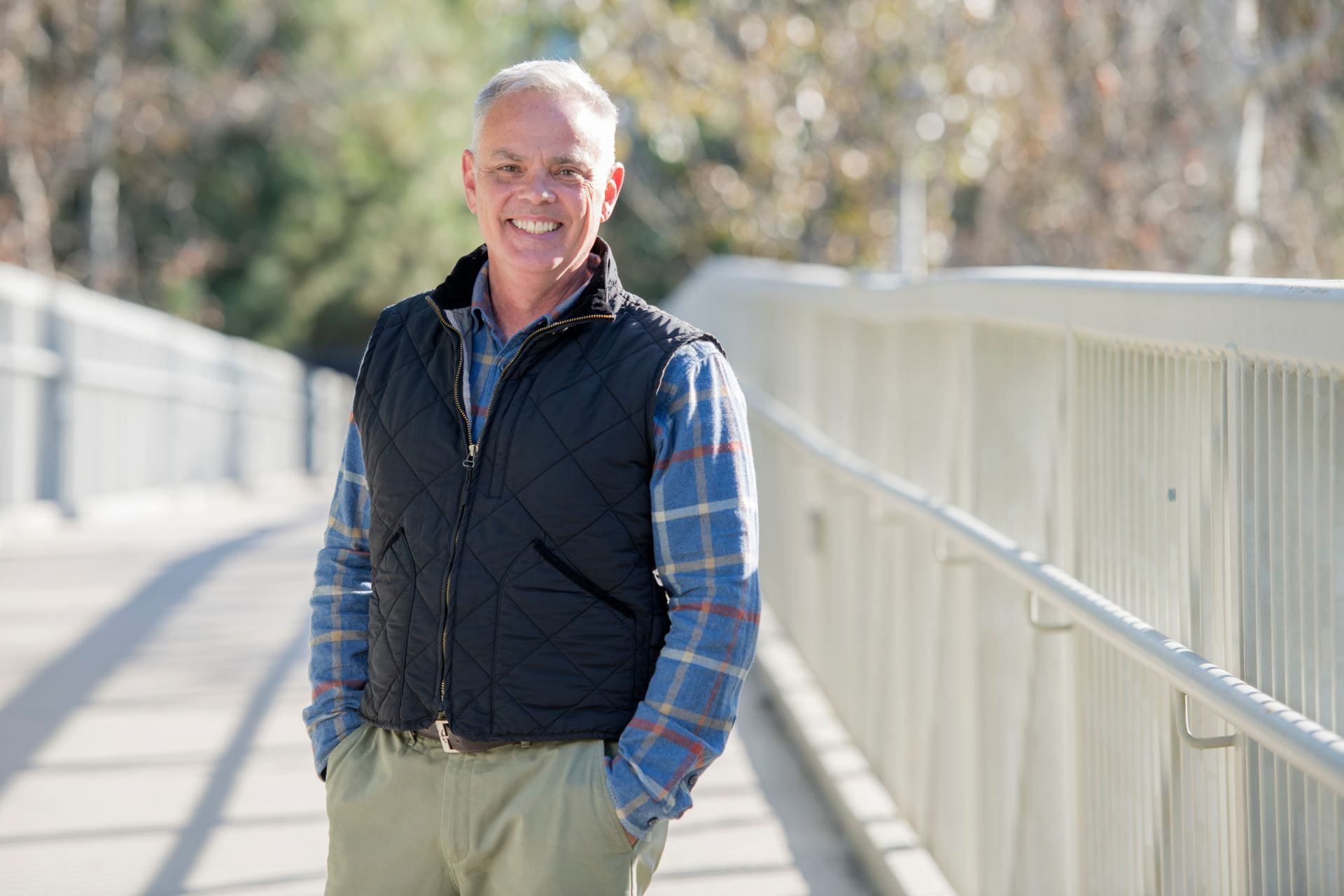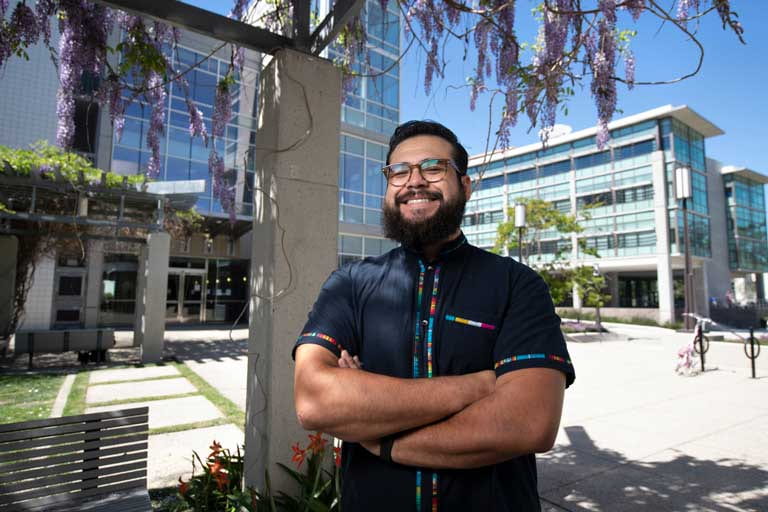A physician-scholar first
UCI grad student Sarah O’Dell is pursuing both an M.D. and a doctorate in the humanities

UCI’s Medical Scientist Training Program, which lets students earn a joint M.D./Ph.D., is mostly for future physicians who want to also engage in biomedical research. But Sarah O’Dell has a different plan: She’s the first MSTP student to pursue a doctorate in the humanities – putting her in the vanguard of a national movement to integrate the humanities into medicine as a way to improve the well-being of patients and doctors alike.
That’s why UCI has created the Center for Medical Humanities, a collaboration among the School of Humanities, the Claire Trevor School of the Arts and the School of Medicine to promote an archetype of healthcare organized around the individual, reflective of cultural identities and responsive to community needs. It serves as a dynamic campus hub for exploring and probing the arc of living and dying from a range of disciplinary perspectives. In addition, the School of Humanities offers a medical humanities minor, and the School of Medicine provides a Program in Medical Humanities and Arts.
Here, O’Dell discusses how UCI has helped accommodate the duality of her studies, what she intends to do with her degrees, and why she believes it’s important to have a humanities outlook on medicine.
Q: What are you studying here at UCI?
A: I’m currently a second-year medical student. Typically, the Medical Scientist Training Program is realized in a “2-4-2” model, in which students split the four years of medical school in half, with a Ph.D. in between. Next year, I’ll begin doctoral coursework in the Department of English. My desire is to bridge these two disciplines through the lens of the medical humanities, studying the intersections among literary narrative, illness, health and personhood.
Q: What made you want to combine medicine and the humanities?
A: I’ve always loved both the sciences and the humanities. As a pre-med at Azusa Pacific University, I minored in both English and Spanish. Before applying to M.D./Ph.D. programs, I decided to pursue a master’s in English at Azusa Pacific. I was especially drawn to UCI’s MSTP because of its inherent flexibility: Distinctively, the program allows students to pursue Ph.D. study in any discipline. In my first year of medical school, I fully realized that joint doctoral training in medicine and English suited both my scholarly interests and my desire to someday practice medicine, teach and write in a university setting.
Of course, my plan is to have a career that integrates the sciences and the humanities. Medicine is wonderful in that it’s inherently interdisciplinary. Illness, health and our conceptions of those states permeate not only so many aspects of our lives, but also a wide variety of academic disciplines. As a future physician with an enduring interest in literature and narrative, the combination has always been natural.
Q: Is anyone else seeking the same M.D. and Ph.D. as you?
A: M.D./Ph.D.s with doctorates in nontraditional fields – especially the humanities and the social sciences – are relatively uncommon. A 2017 survey [in BMC Medical Education] found that there are 100 to 150 M.D./Ph.D.s with doctorates in the humanities or social sciences in the U.S. The majority of these physician-scholars have graduate training in the social sciences, so M.D./Ph.D.s with doctorates in English or literature are rare. In contrast, a recent Association of American Medical Colleges study identified more than 10,000 M.D./Ph.D. graduates in the U.S.
That being said, I’ve met some incredible physician-scholars deeply interested in the medical humanities. Rita Charon, M.D., Ph.D., (founder and executive director of the Program in Narrative Medicine at Columbia University) is a stellar example. She pioneered the growing field of narrative medicine and was selected as the 2018 Jefferson Lecturer in the Humanities by the National Endowment for the Humanities, which is, according to the NEH, “the highest honor the federal government confers for distinguished intellectual achievement in the humanities.”
While I’ll be the first M.D./Ph.D. student at UCI to pursue a doctorate in the humanities, I certainly don’t think I’ll be the last. The connections among medicine, history, literature and philosophy are vital, and I think there’s a deep need for physician-scholars who can effectively mediate within these spaces.
Q: Has your unique combination of studies been hard to navigate, without having set steps to follow?
A: I think it’s been fun! Both the Department of English and the MSTP have been incredibly supportive; I appreciate the encouragement of MSTP director Al Goldin and administrator Joanne Wu, along with several English faculty. I’m eagerly looking forward to this next phase of my education, as well as how my work as a literary scholar will inform my future practice of medicine and vice versa.
UCI’s openness in this regard is, I think, one of the best aspects of an already impressive M.D./Ph.D. program; it’s demonstrative of a clear commitment to interdisciplinary scholarship. UCI’s new Center for Medical Humanities is another example of this commitment. I’m so excited to be part of a program in which multidisciplinary work is encouraged, and I’m grateful to be at UCI, where I have this wonderful opportunity to meld my interests so perfectly.
Q: Why do you think it’s important to have a humanities outlook on medicine?
A: Medicine itself is fundamentally dependent on narrative. Because so much of patient care is predicated on taking a “history” of the patient’s health, being able to attentively “read” and respond to stories of illness is essential to medical practice. The medical humanities speak to this facet of medicine, exploring how the study of literature can increase narrative competence and foster empathy within the provider-patient encounter.
Physician burnout is a real problem, even an epidemic. So much of doctors’ time is spent charting in electronic medical records, navigating insurance billing and performing administrative duties. While the medical humanities can’t directly restructure medicine so that physicians are able to spend more time with patients, a humanities-based approach reorients us to the central locus in medicine: the dynamic partnership between doctor and patient. Literature has this incredible power to enchant and to help us understand the perspectives of others – and, therefore, the potential to transform the ways in which we consider and practice medicine.

